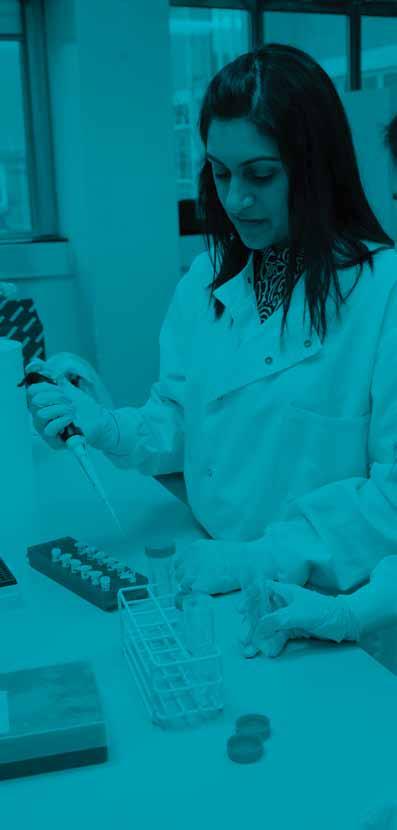Impact Report 2014-18




As I look back on some remarkable achievements in the development of our Charity over the years, there is much to celebrate as can be seen in this publication. There are also many challenges and opportunities ahead.
But I am confident that Hope is on a firm footing to face those challenges and take advantage of those opportunities to fund vital, life-saving cancer research that benefits the people of Leicestershire and Rutland.
That stable foundation has been achieved through good governance from a Board who bring experience, knowledge and - most of allcommitment and passion to our cause and I have been proud to have served as Chairman since 2014.
We have in that time reviewed our governance. We have added to our complement of Trustees to meet the needs of our strategy to ensure that people in Leicestershire and Rutland benefit from new treatments and therapies.
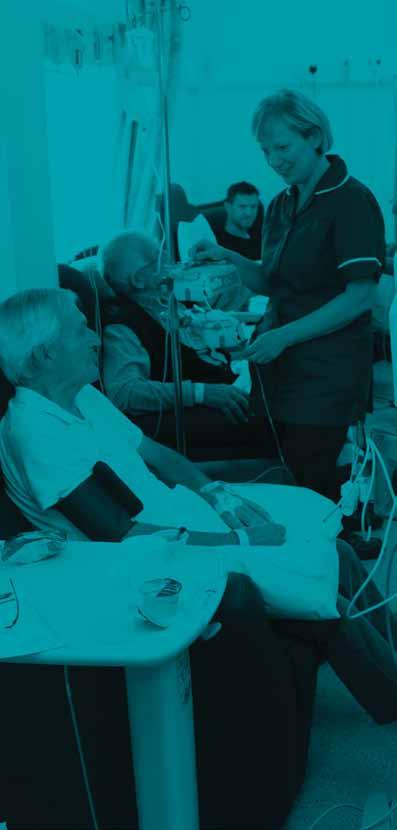
Our Board has collectively ensured that the research we have funded - and continue to fund - with our partners the Universities of Leicester, De Montfort, and Loughborough as well as our local NHS Trusts, offers the best chance of a clear and demonstrable path to positive clinical outcomes.
Rick Moore Chair of Trustees
In 2013, just before I joined Hope, the Charity celebrated its 10th anniversary and published a report covering those years. Since then, Hope Against Cancer has gone from strength to strength, despite the extremely challenging financial environment.
This publication sets out some of our recent achievements and what we aim to accomplish for cancer research in the years ahead. It highlights the role that the local community of Leicestershire and Rutland has played in helping us fund and deliver world-class, life-saving research right here in the city of Leicester. It also highlights the important role of effective partnerships in helping us deliver our mission – from our loyal band of dedicated volunteers, to local businesses, community groups, clubs and public institutions, as well as support from trusts and foundations and individual donors and supporters.
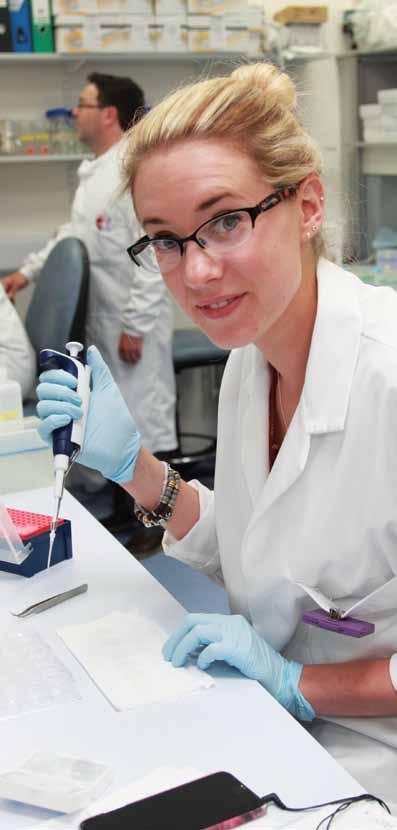
Charities and voluntary organisations are in an era and climate of unparalleled scrutiny about how they are led, managed and how they raise income. Issues of trust, transparency and accountability are to be welcomed by voluntary organisations that truly want to engage with donors, stakeholders and the public.
We receive no statutory or other government funding and I hope that our publication underpins the faith that local people and institutions have placed in us, as we set out what we have achieved for local cancer research and the positive impact you have helped us to make with your donations.
I also hope that by setting out the challenges ahead and Hope Against Cancer’s ambition to fund more research and help more people to live longer, that our publication will inspire you to continue to be a partner, or even to become a new member of the Hope Against Cancer family of supporters.
Remember: Today’s research is tomorrow’s treatment!
Nigel Rose Chief Executive
“Getting a cancer diagnosis is devastating and while we have made great strides in therapy, outcomes can still be improved. This can only be achieved by developing new treatments which require clinical studies. Hope allows us to deliver research with excellence, and it is by doing this that we will continue to improve outcomes for patients.”
Hope Against Cancer supports cutting-edge cancer research in the Leicestershire and Rutland area. We strive for a future where more local people survive cancer. We do this by funding innovative research that leads to improved treatments and better outcomes for local people.
Our focus is on beating cancer - rather than managing its consequences.
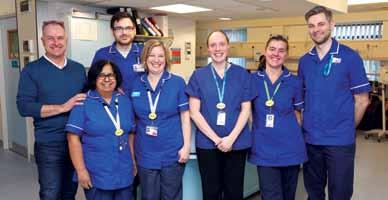
We work in partnership with local universities and hospitals to make sure that Leicestershire is a hub of expertise in cancer research and treatment. Since we were set up in 2003, we have raised over £6 million and funded over 60 research projects tackling many different forms of cancer.
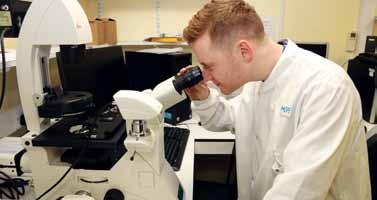
We do not receive any funding from statutory sources and are entirely dependent on voluntary donations to improve the lives of cancer patients in Leicestershire and Rutland.
Anne Thomas Professor of Cancer Therapeutics Leicester Cancer Research CentreWe prioritise local research that investigates the early detection, prevention and treatment of cancers. Our research projects have a clear benefit for patients across the region. We help train the next generation of local researchers through our funding for postgraduates and cancer clinicians. In a time when national funding is being cut or limited we believe that continuing to develop talent in this field is critical.
In 2012 we established a dedicated Clinical Trials Facility at Leicester Royal Infirmary. This offers local patients access to new medicines and therapies. The Facility is a partnership between the University of Leicester, University Hospitals of Leicester NHS Trust and Hope Against Cancer. It is one of only a few places outside London where people can take part in clinical trials to help develop new cancer drug treatments.
The Hope Research Nurse is based at the Clinical Trials Facility, caring for patients who are taking part in clinical trials. The post is usually held for a year, offering new opportunities to nurses working in the Facility and ensuring that patients taking part in clinical trials are provided with specialist care.
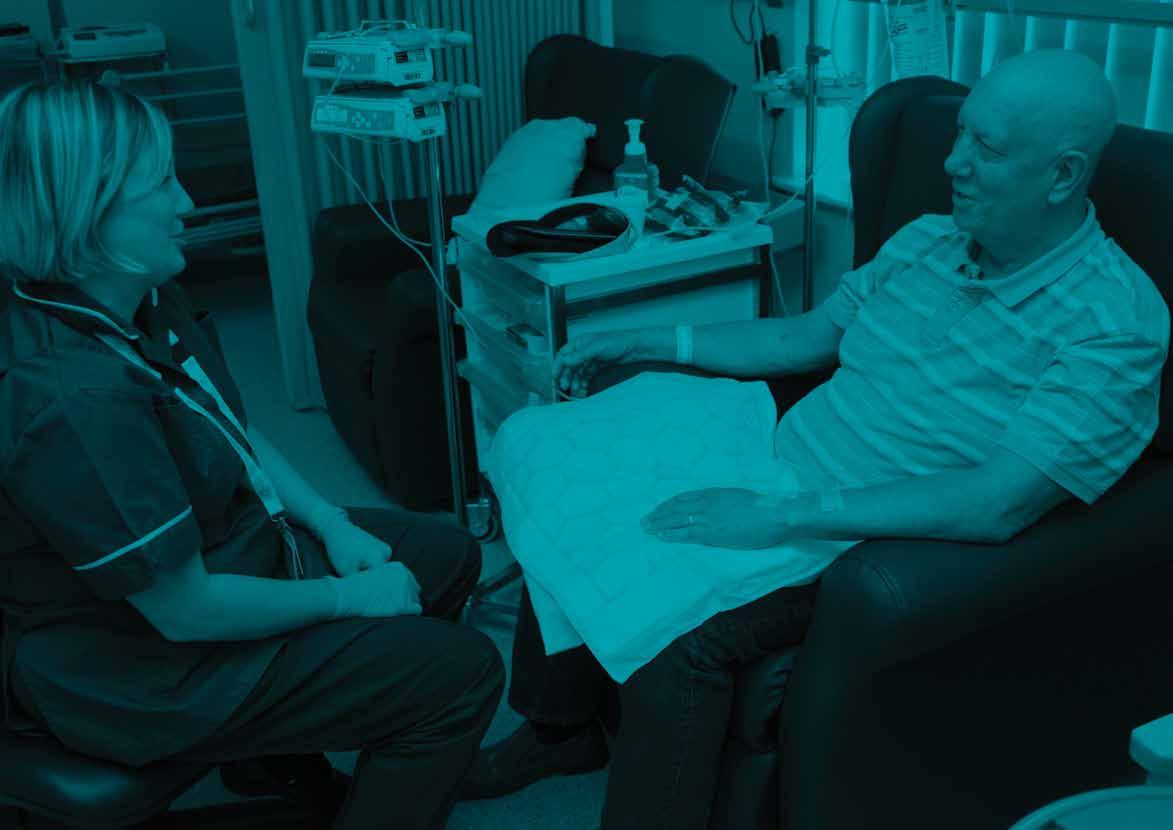
2million
In the UK, over 2 million people are living with or are affected by cancer.
Hope is a small charity that always aims to “punch above its weight”. We are a small core
team supported by dedicated volunteers. This means that we keep our operating costs
to an absolute minimum, so that most of the money that we raise can be put towards meeting our goals.
Our vision is creating a future where more local people survive cancer.
4million £5 billion
This is set to rise to 4 million by 2030.
It is estimated that the annual cost to the NHS for cancer services is over £5 billion.
£18 billion 5,000 people 10years
The cost to society as a whole – in terms of social, caring and other support costs – is estimated to be over £18 billion.
By 2023, we aim to achieve the following:
• More people in Leicestershire and Rutland will survive cancer and have a better quality of life.
• There will have been scientific breakthroughs originating in Leicestershire.
• We will have invested in science that has resulted in improvements to clinical and surgical practice, and that have brought new treatments to market.
Our research strategy includes the following aims:
• Funding research that meets nationally accepted quality standards.
• Giving preference to funding research that is beneficial to the people of Leicestershire and Rutland in particular, and initiated or carried out in the two counties.
In Leicester and Leicestershire and Rutland alone, around 5,000 people are diagnosed with cancer each year.
• We will be funding more of the best students and scientists.
• We will have identified Leicestershire’s next generation of leaders in cancer research.
However, because of lifesaving research more people than ever before are surviving the disease, with over half now living for 10 years or more after diagnosis.
Statistics courtesy NHS England and CRUK.
• Working in partnership with the recipients of our funding to develop expertise and talent within Leicestershire and Rutland.
• Funding research that offers a clear and demonstrable path to positive clinical outcomes.
“Statistics like these demonstrate why it is so important to have cancer research being carried out locally. There is over-whelming evidence to show that regions with diverse, local research have better health outcomes within their communities.”
Nigel Rose, CEO Hope• Giving preference to proposals with the greatest chance of delivering their stated objectives.
• Funding research where there is confidence that the research team and organisation are committed to delivering the research objectives.
• Working in partnership with the recipients of our funding to ensure the highest standards of governance, financial control, project management and dissemination.
Since our last report, which was our 10 year history booklet, we have made significant strides in reaching our goals.
• We have funded an additional 20 research projects based in Leicester. Some of these have made significant progress in the treatment of bowel, blood and breast cancers. You can read more about some of the ground-breaking research we have funded on the following page.
• We have invested in young researchers who are just starting their careers. Many of those we have supported continue to work in our hospitals, contributing to health of our local people.
• In 2013, Hope was instrumental in Leicester becoming a Cancer Research Centre of Excellence in partnership with Cancer Research UK, the University of Leicester, the University Hospitals of Leicester NHS Trust and the Medical Research Council. As a key local partner, we contributed half a million pounds to the Centre over four years, funding research projects into the early detection and prevention of cancers, and the development of targeted medicines.
• Through our Clinical Trials Facility thousands of patients have taken part in clinical trials locally, many supported by our Research Nurse.
• Hope has funded new equipment to further cancer research in Leicester. For example, in 2016, we provided £80,000 for a state-of-the-art DNA sequencer for Leicester Royal Infirmary.
• Hope has funded small research projects to the tune of over £200,000. This addressed the need for smaller items of research equipment to be funded - which are often not eligible for traditional funding streams.
“Undoubtedly in the 15 years of its existence, Hope has made a fantastic impact on cancer research in Leicestershire and Rutland in terms of both quality and quantity.”
Professor Andy Gescher, (retired)
The Department of Cancer Studies at the University of Leicester
Hope Against Cancer has supported many researchers over the years, including many who were just setting out in their careers. This included establishing two Clinical Fellowships to fund innovative cancer research in the region. On this page we take a look at just some of the exciting work that has been carried out by those funded by Hope.
In 2015, Dr Mark Openshaw was awarded a Clinical Fellowship to investigate the use of cell-free DNA as a “liquid biopsy” in a range of common cancers. The aim was to improve the options for cancer therapies and to see if it is possible to develop treatments that are appropriate for the individual patient.
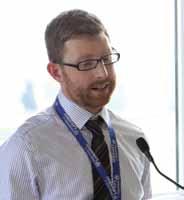
The benefit of developing a “liquid biopsy” – using a blood test to detect cancers and guide cancer treatment– is that the patient does not have to undergo repeated biopsies of their tumours, which can be intrusive and sometimes not possible to carry out. Mark said: “The department of Cancer Studies at the University of Leicester has significant expertise in the area of cell-free DNA research, and I am extremely grateful to Hope Against Cancer for providing the
support and facilities to enable me to carry out this research.”
Dr Josephina Sampson completed her PhD in 2017, and was jointly funded by Hope Against Cancer and the Medical Research Council. Her pioneering research revealed a new pathway that could be targeted to give a more tailored treatment for cancer in the future.
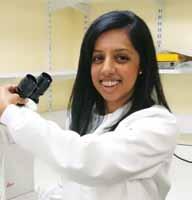
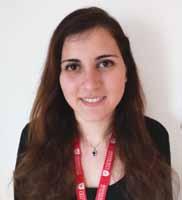
Josephina explains: “The purpose of my research was to provide a better understanding of how cancer cells deal with abnormal cell division and whether this can provide new insights that allow for the development of drugs that selectively target and kill cancer cells. Hopefully this will ultimately lead to new therapies with fewer, or ideally no, side-effects.”
Her findings have been published in the prestigious journal, Cancer Research.
Two researchers have been looking at the active ingredient of the spice turmeric (known as curcumin) to see how it may improve outcomes for patients with bowel cancer.
Hope funded Dr Chinenye Iwuji to investigate whether curcumin was safe for patients to take at the same time as their chemotherapy drugs for bowel cancer that had spread to the liver.

Chinenye found that patients were able to safely take 2g of curcumin a day. She is now a Consultant Medical Oncologist at the University Hospitals of Leicester NHS Trust, and will continue to look after
Anne Thomas Professor of Cancer Therapeutics Leicester Cancer Research Centre“The Hope Clinical Trials Facility has been transformative for patients, researchers and the future generation of researchers.”Dr Mark Openshaw Dr Josephina Sampson Dr Chinenye Iwuji Dr Sameena Khan
patients who are receiving chemotherapy for bowel cancer.
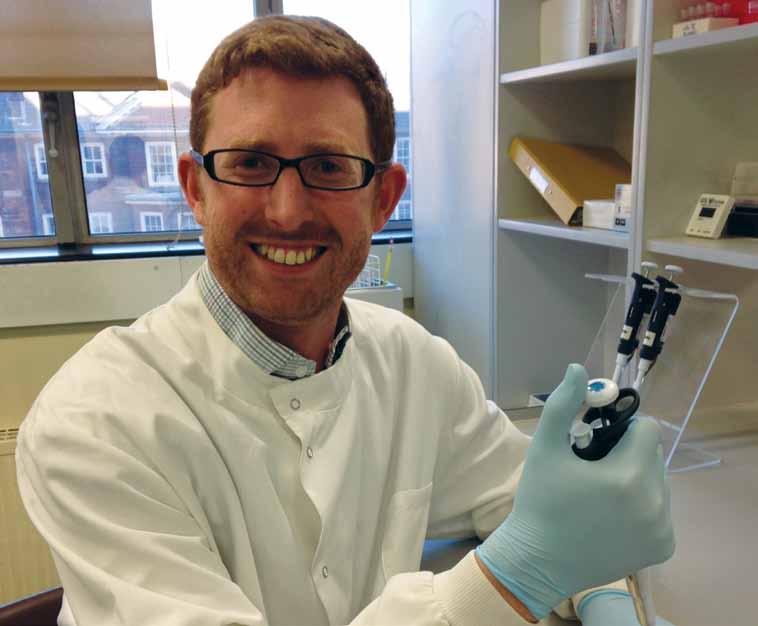
Chinenye said: “Hope sponsored my PhD research project during my specialist registrar training at Leicester Royal Infirmary. It was a great privilege to be able to offer patients a novel treatment agent, giving them new hope in their cancer journey. I learned an invaluable new set of skills both in the laboratory setting as well as in the field of clinical trials. “
Dr Sameena Khan was awarded a Clinical Fellowship in 2015, to investigate the use of curcumin as a cancer prevention agent in bowel cancer.
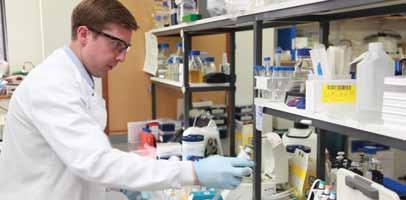
She said: “Research in this area is critical - currently up to half of patients diagnosed with bowel cancer, present at a stage, where sadly we are unable to offer potentially curative treatment. It is hoped that this research will improve our understanding of cancer biology and develop the use of cancer prevention agents in a clinical setting. I am extremely grateful to Hope Against Cancer for providing the support and facilities required to carry out this research.”
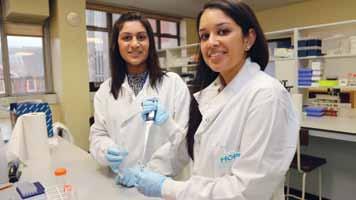
“We are very grateful to Hope Against Cancer for the support they offer to PhD students. This is absolutely vital for the training of the next generation of cancer researchers.”Professor Andrew Fry University of Leicester
“As a result of funding by the Charity, the Hope Clinical Trials Facility provides a fullyequipped, dedicated clinical environment for patients to safely participate in trials. Through it we can offer entry to early phase trials, which frequently provide access to novel treatments and therapies. This first rate accommodation attracts pharmaceutical sponsors, which has enabled us to significantly expand our research portfolio.”
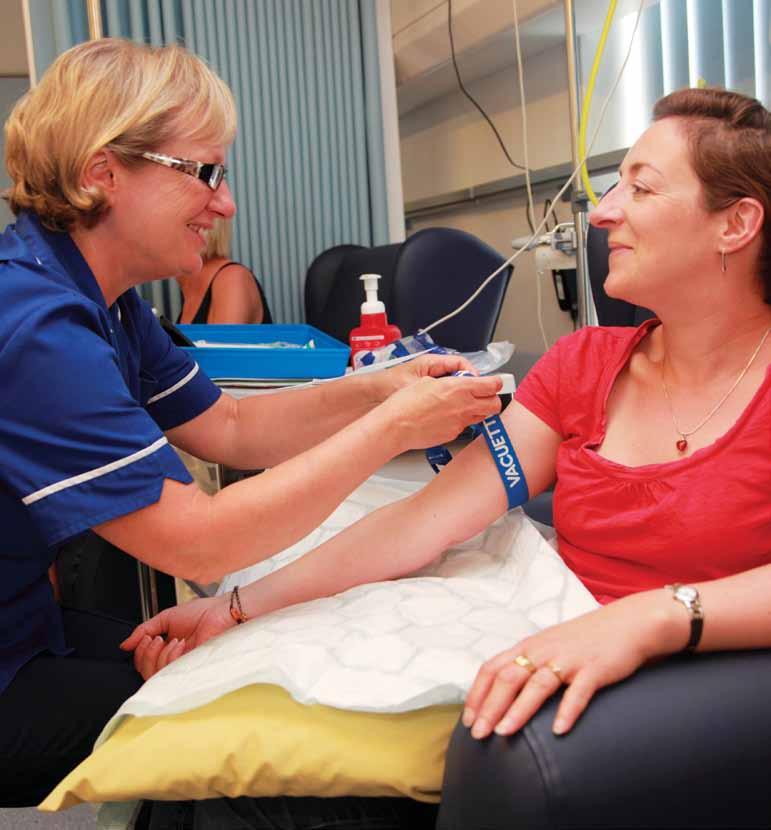 John Adler Chief Executive University of Leicester Hospitals NHS Trust
John Adler Chief Executive University of Leicester Hospitals NHS Trust
Clinical trials offer hope for many people and an opportunity to help researchers find better treatments for others in the future. The Hope Clinical Trials Facility is a dedicated area in Leicester Royal Infirmary for patients taking part in clinical research studies.
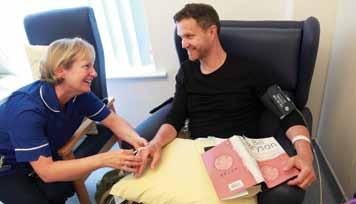
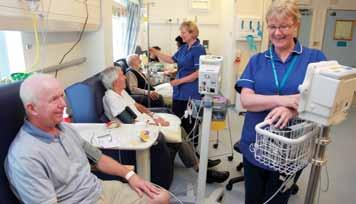
Opened by our Patron, Martin Johnson in May 2012, the Facility has been funded by Hope, the University of Leicester Hospitals NHS Trust and the National Institute for Health Research.

Clinical trials are carried out by researchers to find out whether new treatments are safe, are more effective than current treatments, or if they improve the outcomes for patients. Clinical trials can look at different aspects of disease – such as the causes, how it might be prevented, or different ways of diagnosing it in the first place. Research is also carried out to find new treatments, or to control the symptoms of the disease.
Taking part in a high-quality clinical research study can provide patients with more treatment options. Evidence suggests that patients who take part in clinical trails have better outcomes than those who are treated in a non-research environment.
Being diagnosed with cancer can be a frightening experience. But people who take part in clinical trials at the Hope Clinical Facility find a warm and welcoming place. The Facility has two consultation roomsoffering people the privacy to talk to a nurse or doctor about anything that may be concerning them - as well as eight treatment chairs, and a bed for overnight stays.
People receive more personal treatment here, as they are more closely monitored, seen by a doctor more frequently, and their treatment can be adapted to changing circumstances. Their care is overseen by the Hope Research Nurse.
“I’ve taken part in a trial at the Hope Clinical Trials Facility, alongside chemotherapy treatment. It gives me more hope and it boosts me because I feel as if I am helping others.”
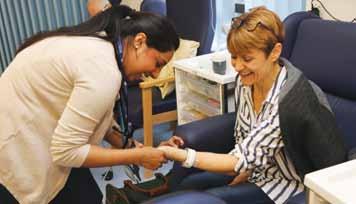
At Hope Against Cancer we’re proud of our Leicestershire roots and over the past few years, we have worked hard to engage with all sectors of the community. As a result, we have seen support from businesses, community organisations and individuals grow. We are delighted that we have backing from every sector of the community – including the Mayor of Leicester, the Sheriffs of Leicestershire and Rutland, sports clubs such as Leicester Tigers, Leicester Racecourse, basketball team Leicester Riders, blue-chip companies, small and medium-sized enterprises, charitable trusts and foundations, members of the creative industries, community and voluntary groups, as well as the amazing individuals who take on the most extraordinary challenges to raise funds for our Charity.
Every contribution to our cause helps us to fund cutting-edge cancer research in the local area. There are too many to mention but here are just some of our highlights from the past three years.
Rubgy legends Leicester Tigers chose Hope Against Cancer as one of their official club charities for the 2017-18 season, helping to raise awareness of our work with new audiences, and to lend their support to our fund raising activities.
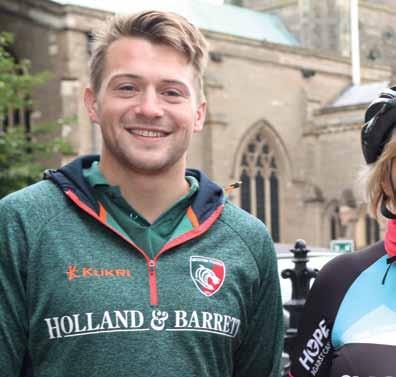
Local basketball team champions, Leicester Riders became involved in 2017. Captain Tyler Bernardini explained: “I got involved with Hope because I want to be able to use my profile and success here in Leicester for a greater purpose. Hope Against Cancer has already had an incredible impact on cancer research and treatment in Leicester. The future of cancer research is extremely promising, but we must all get behind them and support their efforts.”
In 2016, Hope was one of the beneficiary charities of the High Sheriffs of Leicestershire and Rutland, with both undertaking fundraising activities for our Charity.
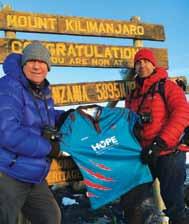

Representing the arts, Leicester-based artist and architect, Douglas Smith, author of eight books on architecture, design, paintings and sketches, has raised over £35,000 for Hope. All the money from the sales of books and prints he donates to Hope Against Cancer.
Finally, a big thank you to our loyal band of longserving volunteers in Rutland, for their ongoing contributions, including our “Bold and Blue” fundraising campaigns.

Many people who have family, friends or colleagues whose lives have been affected by cancer, have raised funds for Hope.
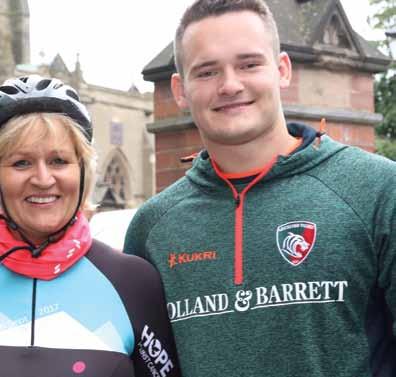
The team at Evolve Consultants - a software development company based in Leicester - chose Hope as their Charity of the Year in 2017. For one of their fundraising activities they undertook the Midlands “Tough Mudder” - a gruelling five miles of mud and obstacles, designed to test teamwork to the limit. CEO Leanne Bonner-Cooke explained: “We chose Hope Against Cancer as we sadly lost a team member to the disease recently. We wanted to do something in his memory.”
Roger Collings, Managing Director at RDC Communications Ltd based in Wigston, raised funds in the summer of 2017, by driving an old banger 1,700 miles across Europe, finishing in Benidorm, on the Costa del Sol.
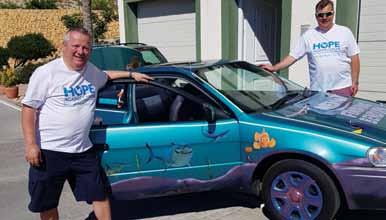
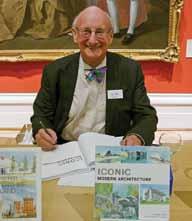
Roger explained: “We did this to raise money in memory of a fantastic young lady, Jodie Johnson, who was a friend and work colleague who died of cancer last year when she was only 32.”
Hope has also won the support of national and local celebrities, from the winner of the Great British Sewing Bee, Heather Jacks, and Great British Bake Off contestant Rav Bansal. In October 2017, Peter Andre visited the Hope Clinical Trials Facility and gave a talk in support of Hope.

The average research project costs £150,000 and takes two years to complete.
At Hope we never forget that we wouldn’t be able to what we do, without our amazing supporters – from our volunteers going the extra mile, to those stretching themselves through challenges such as cycle rides and marathons, to local groups holding tea parties, companies making us their Charity of the Year, to individuals leaving us a legacy in their will.
We extend our heartfelt thanks to everyone whose contributions – however great or small, help us to continue in our determination to beat cancer through world-class research.
Membership
costs
Hope Against Cancer has enjoyed some excellent corporate partnerships and generous support from local companies over the years. As well as raising vital funds, companies have donated gifts as well as time and expertise, and have supported their staff’s involvement with us too.
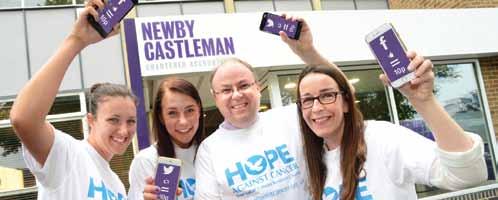
Our vision for working with the local business sector is to truly understand a company’s objectives for community investment and identify any areas where we can be a partner to help fulfil these objectives while supporting the vision of our Charity.
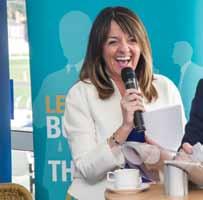
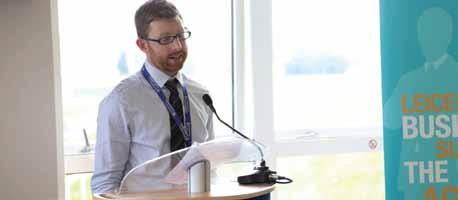

Led by Hope Trustees Duncan Green and Eileen Richards, the club holds two meetings a year. Here, members can network, find out more about Hope’s work, and how they can support it. The meetings usually include a presentation from a Hope researcher and a talk by a cancer patient, illustrating how important cancer research is to the local community.
Members pledge to raise a minimum of £1,500 over the course of two years to support Hope’s work. Their dedicated account manager at Hope offers support to help maximise their fundraising efforts and to ensure that they comply with fundraising standards.
Hope’s Business Club has attracted a host of local businesses from blue-chip companies such as NEXT plc, to small and medium-sized enterprises such as taxi firm ADT and chartered accountants Newby Castleman. They find it is a great way to raise their own profile, as well as support a good cause.


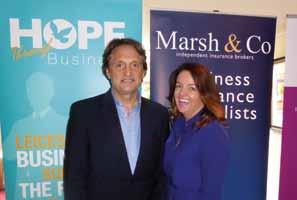
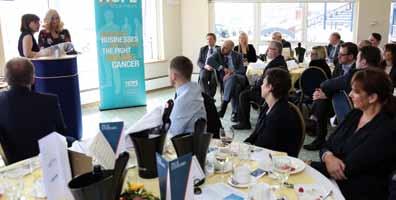
Some recent innovative fundraising activities have included Newby Castleman using the power of social media to help spread the word about Hope. They donated 10p for the first 10,000 retweets or likes received on their Twitter or Facebook posts that linked to the Hope Against Cancer homepage, to a limit of £1,000.
Leicestershire based ADT Taxis launched an App called Riide. Their customers can call a cab at a touch of a button and support Hope at the same time. The App links to over 23,000 cars and any tip offered to their drivers is given to Hope Against Cancer.
ADT’s Managing Director, David Hunter said: ‘’ We chose Hope as they are a local charity, supporting local cancer research. Cancer touches all our lives one way or another, and if we can contribute to a breakthrough through our local community, then this has to be worthwhile!”
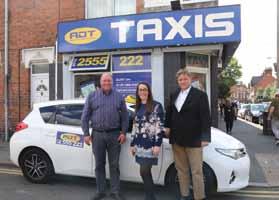
“An existing member invited me to the Business Club. It was fascinating to find out about the research that is being carried out, and good to gain an understanding of where the money that is raised is being spent. Listening to the stories of cancer sufferers was inspiring. Now that I am a member, I am looking forward to nurturing the relationship between TMDP and Hope.”
Nikki Bryan Director of Sales & Marketing
TMDP Group
The cycle challenge is made possible through the generous support of local businesses and companies, large and small, who contribute through sponsorship. Their support really helps reduce our costs and maximises the income that the cyclists and support team raise to fund local cancer research.
One of Hope’s key fundraising activities is its biennial cycle ride – where cyclists of all abilities take part in a challenge that will test themselves to the limit and raise hundreds of thousands of pounds for Hope at the same time.

As well as wanting to challenge themselves, many of the cyclists also have personal reasons for taking part, either because they have had cancer themselves, or because someone close to them has.
Since 2013, the Hope cycle rides have raised over £300,000 for local cancer research.
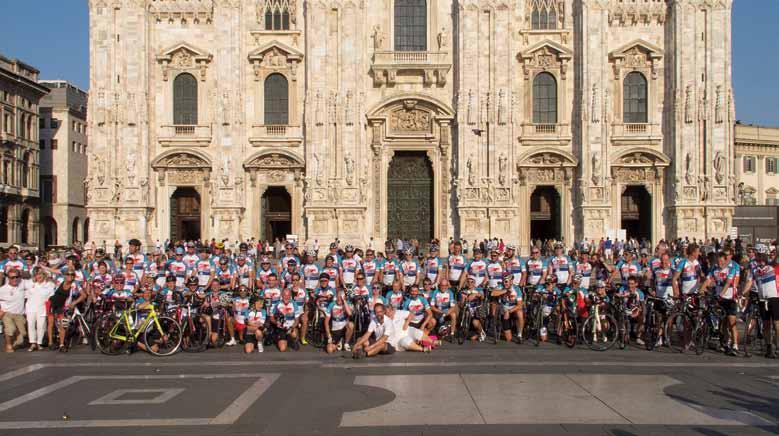
In 2013 the cycle challenge headed off to Amsterdam for a round trip of over 400 miles. Fifty four cyclists completed the ride, including Hope’s Patron and Leicester Tigers and England Rugby legend, Martin Johnson.
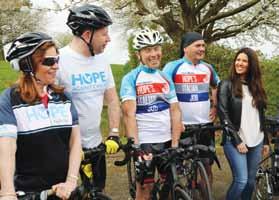
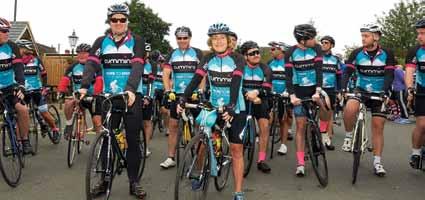
“Hang on lads; I’ve got a great idea….”
In homage to the classic 1969 Italian Job film, Hope’s challenge this year saw 72 intrepid cyclists taking on the Italian Alps. Once again, Martin Johnson joined the cyclists, who over four days cycled 360 miles, taking in the dizzying heights of the Swiss and Italian Alps and climbing a total of 17,000ft - all to raise money for our Charity.
Teacher Vicki-Ann Peacock commented: “I only took up road cycling last year and never dreamt I would be riding over the Alps! Knowing that the money we raised can make a huge difference to those undergoing treatment for cancer was the motivation to keep pedalling and conquer those dreaded climbs.”
In 2017, the cyclists stayed closer to home, but this did not mean it was any less of a challenge! Fifty intrepid cyclists took part in the 320 mile round trip through the punishing hills of the Peak District.
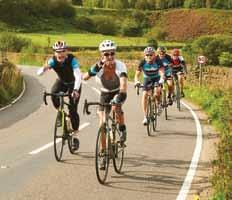
David Lilleyman who took part in a clinical trial in 2014 to treat throat cancer said: “I did the cycle challenge to give something back to Hope Against Cancer, so they can continue doing the vital research and trials to make beating cancer easier.”
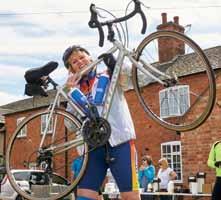
CEO Nigel Rose said “Our cycle rides have become legendary, and the support we receive from the local community is always fantastic. The riders have to train so hard to make sure they are ready for anything, and each year we exceed our fundraising targets. Although the rides are great fun, and a great challenge, we never lose sight of the amazing amounts of money that our teams raise for local cancer research.”
“Each ride has needed essential volunteer lead organisers, support cyclists and crew - a big thank you to all of those dedicated people for their time and commitment.”
Since we were set up in 2003 here are some of our achievements in numbers:
£6million 4 HOPE NURSEs 17,000 £600,000
Raised over £6 million through donations, events and fundraising.
68 research projectS
Funded 68 Research Projects including investigations into blood, breast, bladder and prostate cancers. Each year, we provide the opportunity for a nurse working at the Clinical Trials Facility to gain new skills by becoming the Hope Research Nurse.
Clinical Trials offer patients the opportunity to access new treatments and therapies and evidence suggests that patients who take part in clinical trails have better outcomes than those who are treated in a non-research environment.
Retired builder Robert Ward (pictured far right) was diagnosed with Non-Hodgkin lymphoma in October 2010. Following a range of treatments, including chemotherapy, radiotherapy and even a bone marrow transplant, he thought he was in the clear. But the cancer returned – and Robert’s treatment options were limited. His consultant suggested that he take part in a clinical trial, at our Clinical Trials Facility at Leicester Royal Infirmary.
Robert explained: “As soon as I started taking part, I could feel the difference the drug was making. The cancer started reducing as soon as I started the clinical trial.”
He said: “I was looked after by the Hope Nurse, Theresa, and I am so pleased with the treatment I received at the Hope Facility.”
Sadly not everyone who takes part in a clinical trial can be hopeful of a cure. Jo Sutton, 37, was diagnosed with advanced breast cancer in September 2015. She is taking part in a clinical trial which involves two well-known cancer treatments being taken at the same time.
Patient attendances at Hope’s Clinical Trials Facility.
Robert is now in remission and is going from strength to strength. From being so weak that he could hardly walk, in June 2015, he took part in the 54 mile London to Brighton bike ride to raise funds for Hope and in 2017 completed the gruelling 148 mile Coast to Coast cycle ride.
The amount we need to raise each year to fund our existing research commitments.
Company Director, Derek Hodder took part in a clinical trial at Hope’s Clinical Trial Facility in 2015. Diagnosed with throat cancer, he underwent three months of treatment that included having his tonsils taken out, radiotherapy and chemotherapy. Now he has been given the all clear.
Jo’s fiancé, Jonny Larson said: “There is no cure for Stage 4 breast cancer, so the emphasis is simply on extension and quality of life. The amazing work that the Hope nurses do is indescribable, I cannot put into words how caring and thoughtful their nurses are. Unfortunately, Jo is a regular at the Facility but the personality of their nurses epitomises the work they do.”
In July 2017, Jo was awarded the Bravery and Courage Award at the Pride of Leicestershire Awards held at the King Power Stadium. She was praised by the judges for her fundraising and her role in raising awareness about cancer.
“Hope was a key partner in Leicester becoming a Cancer Research Centre of Excellence in 2014. This enabled us to transform our capabilities, and implement new treatments and diagnostic methods. We could not have done this without Hope.”
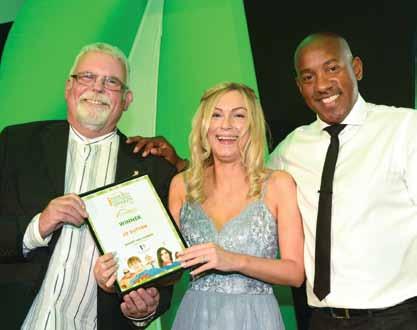
 Professor Catrin Pritchard Cancer Lead University of Leicester
Professor Catrin Pritchard Cancer Lead University of Leicester
To put things into context:
Without the support of our local community, Hope couldn’t continue its work to
£50 pays for a day’s time of our specialist Hope Clinical Research Nurse.
£400
£50 £1,500 £2,500 £75,000
£400 pays for a day of expert research time and use of equipment for the early detection and prevention of cancer.
fund vital local cancer research.
£1,500 buys a specialist fluorescent laboratory microscope, essential for our Hope-funded researchers to analyse cells.
£2,500 pays for our research teams to produce essential literature and hold conferences that disseminate research findings to international audiences. This helps improve future treatments and practices.
Of the £2.6 million raised during this period, £2 million has been committed to research projects.
£75,000 a year funds a Hope Clinical Research Fellowshipthe average project lasts two years.
We are registered with the Fundraising regulator. The regulator works to ensure that organisations raising money for charity from the public do so honestly and properly. As members of the scheme, we follow the Institute of Fundraising’s Code of Fundraising Practice and comply with the key principles embodied in the Code and in our Charity’s fundraising promise.

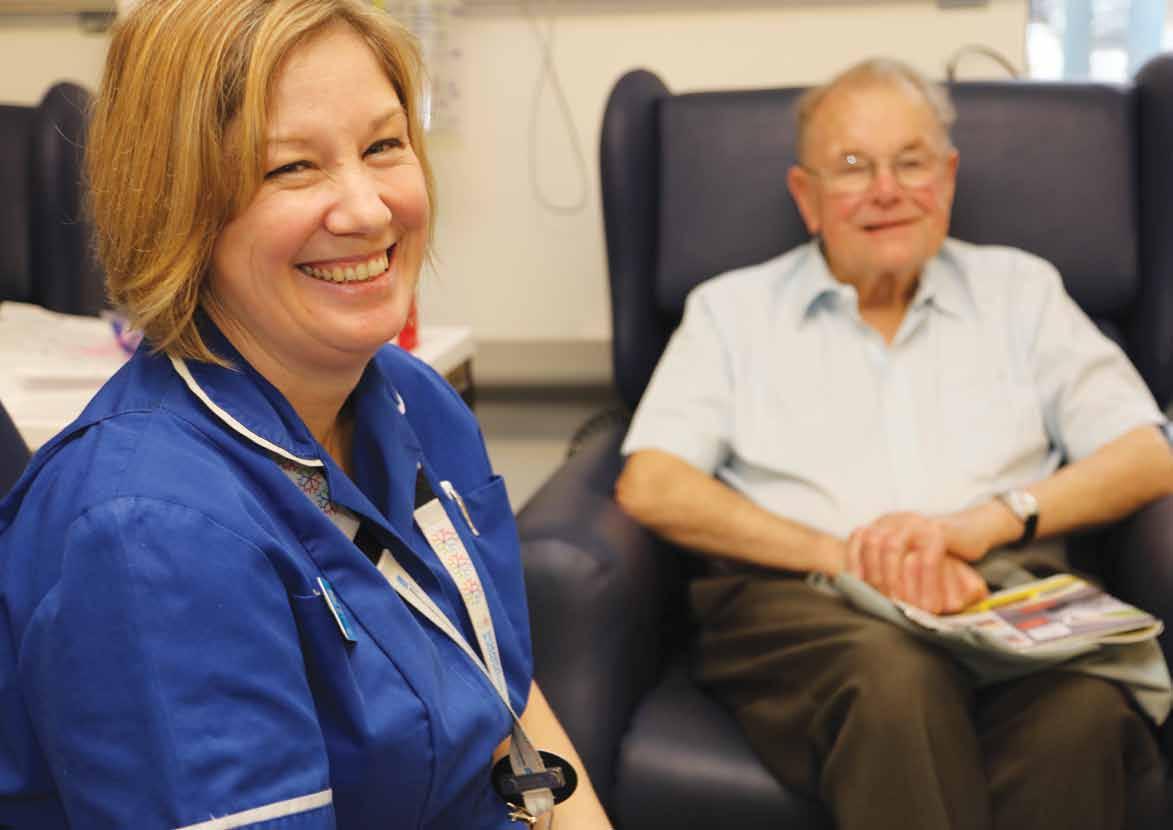
Around 5,000 people in Leicestershire are diagnosed with cancer each year and the region currently has areas where there are high incidences of specific cancers, associated with cultural and socio-economic factors and healthcare inequalities. However, there is over-whelming evidence to show that where local research is being carried out, there are better outcomes for local people.
We want Leicester and the surrounding area to become a renowned area for cancer research, able to attract the most able staff and provide the best available training for doctors and nurses in the field of cancer care and so deliver better outcomes for people with cancer.
There are many ways in which you can support our work and help us continue to make real progress in tackling cancer. The cost of an average research project is £150,000 and takes two years to complete. These projects play a vital role in our mission to beat cancer. We do not receive a penny from government or from local authorities – we have to raise all our income ourselves.
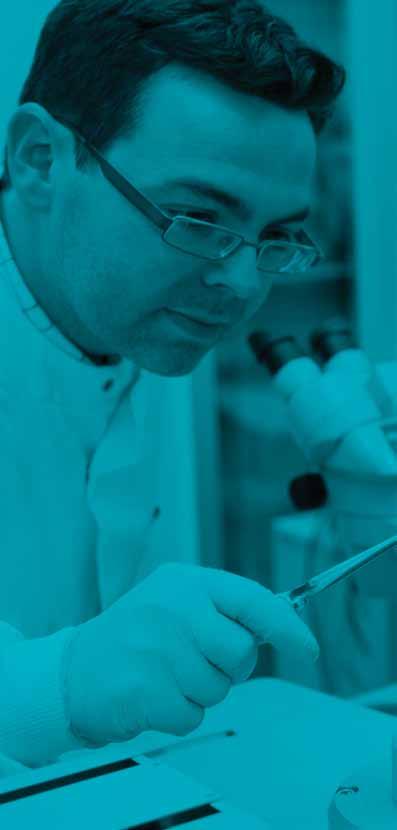
“The money we raise locally goes to fund local cancer research. We are a small, but ambitious and growing Charity making a huge difference. We are proud that we are making that difference to driving forward worldclass cancer research right here in the city of Leicester. By supporting us, you can be confident that you are helping to improve cancer outcomes for local people throughout Leicestershire and Rutland.”
Nigel Rose, Hope’s CEOWe’re proud of our local Leicestershire roots – and we’re committed to creating mutually beneficial relationships with our region’s wealth of successful businesses and organisations. Our Business Club offers you the opportunity to network as well as find out more about Hope.
We are fortunate that many local companies and organisations have chosen to make Hope their Charity of the Year – from Leicester Tigers, to local pub chain Steamin’ Billy. Our fundraising team can help you will your fundraising activities.
We organise many of our own special fundraising events throughout the year. There are lots to choose from - you can have a great time while supporting a great cause as well. These are listed in our newsletters and on the events pages of our website.
If you enjoy taking on a personal challenge – such as cycling the Italian Alps, trekking the peaks of Africa or running the London Marathon, then we can help you achieve your personal goal while you raise money for our good cause at the same time.
Hope Against Cancer couldn’t function without its team of dedicated volunteers, who put both time and effort into our Charity – there are opportunities to volunteer with us in all sorts of ways.
Legacies are vital to Hope Against Cancer and go towards funding our cutting-edge research.
Over half of our income each year comes from individual donations and from people organising their own fundraising activities. We are extremely grateful for any donation, whether large or small as it all helps us to continue our vital work.
We are grateful to the local trusts and foundations that support our work. If you have a trust or foundation, please consider supporting one of Hope Against Cancer’s research projects. We would be very happy to meet with you to talk about our plans.
These are just some of the ways in which you can help us support local, world-class cancer research. Visit our website or give us a call to find out more about how you can support Hope. hopeagainstcancer.org.uk 0116 270 0101 enquiries@hopeagainstcancer. org.uk
